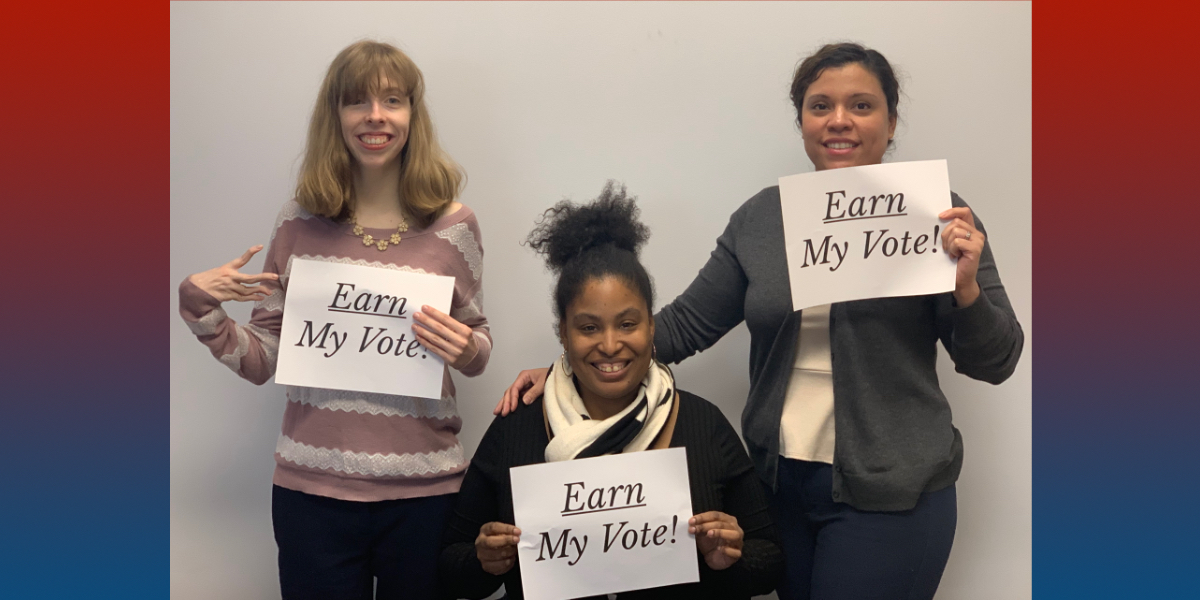Washington, D.C., July 15 – RespectAbility, a nonpartisan national nonprofit organization fighting stigmas and advancing opportunities so people with disabilities can fully participate in all aspects of community, is sending its nonpartisan voter questionnaire to candidates in competitive Senate and Gubernatorial races across the country. The outreach is being done in conjunction with RespectAbility’s online publication, TheRespectAbilityReport.org, which focuses on the intersection of disability and electoral politics. The answers to the questionnaire will be turned into nonpartisan voter guides in key battleground states across the country. This questionnaire builds on candidate outreach work done in 2020, 2018 and 2016.
One-in-five Americans has a disability, according to the U.S. Census Bureau. People with disabilities are America’s largest minority group and the only one that, due to accident, aging or illness, anyone can join at any time. Indeed, America has 61 million people with disabilities.
Voters with disabilities want access in democracy, just like anyone else. At the same time, they have specific issues of interest. For example, of the 22 million working age (18-64) people with disabilities in our country, fully 70 percent of them are outside of the labor force.
Polling data of the battleground states shows that the disability community is large and electorally contested, but the issues they care about most are not being sufficiently addressed. More than half of the electorate in the battleground (59 percent) self-identifies as having a disability (16 percent), having a family member with a disability (32 percent) or having a close friend with a disability (11 percent).
“Candidates for office ignore the disability community at their peril,” said Olegario “Ollie” Cantos VII, RespectAbility’s Chairman.
Here are the questions for which campaigns will need to provide answers:
- EDUCATION & SKILLS: In our nation’s public schools, there are 6.5 million students with disabilities. The changing demographics of America are reflected in the student population, with over 56 percent of them being Black, Indigenous, or People of Color (BIPOC) individuals with disabilities. 11.4 percent of students with disabilities nationwide, or almost 720,000 students, identify as English-language learners. The gap in graduation and drop-out rates between students with and without disabilities continues to undermine their futures. For example, in the class of 2019, only 65 percent of Black students with disabilities, 69 percent of Hispanic students with disabilities, 76 percent of white students with disabilities, 78 percent of Asian-American students with disabilities, and 71 percent of Pacific Islander students with disabilities completed high school. What is your plan for ensuring that all students with disabilities, including English Language Learners, receive a quality and appropriate education to acquire critical and marketable skills?
- EMPLOYMENT & ENTREPRENEURSHIP: Prior to the COVID-19 pandemic, the national employment rate for working-age people with disabilities in America was 38.8 percent, compared to 78.6 percent of people without disabilities. These disparities vary from state to state and differ by race. In fact, 40 percent of white working-age people with disabilities have jobs, compared to only 32.1 percent of those who are Black, 39.4 percent of those who are Hispanic/LatinX and 43.2 percent of those who are AAPI. Compounding the problem, the pandemic has ravaged the disability community and more than 1 million workers with disabilities have lost their jobs. If elected, what will you do to advance opportunities for people with disabilities who want to work and earn an income, just like anyone else? How will you support employers, large and small, to recruit and hire workers with disabilities? How will you promote evidence-based policies and best practices leading to meaningful careers as well as disability entrepreneurship opportunities?
- ACCESS & INCLUSION: The disability community lives by the motto “Nothing about us, without us.” We must have a seat at any decision-making table that affects us – which is every table, as disability cuts across all other demographics. Those with lived experience know the solutions that work and must be part of the decision-making process. As such, campaigns are most successful when they develop connections to constituents with disabilities, recruit volunteers with disabilities, host public events in accessible spaces and make their campaigns accessible online. Whether or not you have a formal platform, what specific plans do you have to incorporate the voices of people with disabilities into your decision-making processes, if elected? What steps, if any, have you taken to make your campaign accessible for people with disabilities and to ensure that our voices are heard?
- FIGHTING STIGMAS: There are significant stigmas that create attitudinal barriers that limit options and perpetuate low expectations for people with disabilities. Elected officials, as public figures, have many opportunities to help fight stigmas by demonstrating a commitment to community inclusion, celebrating the contributions of people with disabilities, and marking key celebrations such as National Disability Employment Awareness Month. If elected, what will be your plan to fight stigmas, highlight the disability community, and promote higher expectations for success?
- OTHER KEY ISSUES: Housing, criminal justice, climate issues, voting rights, transportation and every other issue area have significant impacts on people with disabilities. What additional policies and priorities, other than those already discussed above, do you plan to focus on to improve the lives of people with disabilities? If you have yet to develop them, what is your plan to learn about disability issues?
RespectAbility is a nonprofit, nonpartisan organization that fights stigmas and advances opportunities so people with disabilities can fully participate in all aspects of their communities. RespectAbility does not rate or endorse candidates. View more coverage of 2020 candidates.

Be First to Comment